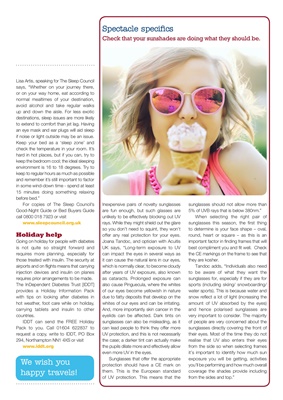
Spectacle specifics
Check that your sunshades are doing what they should be.
Inexpensive pairs of novelty sunglasses
are fun enough, but such glasses are
unlikely to be effectively blocking out UV
rays. While they might shield out the glare
so you don't need to squint, they won't
offer any real protection for your eyes.
Joana Tandoc, and optician with Acuitis
UK says, "Long-term exposure to UV
can impact the eyes in several ways as
it can cause the natural lens in our eyes,
which is normally clear, to become cloudy
after years of UV exposure, also known
as cataracts. Prolonged exposure can
also cause Pinguecula, where the whites
of our eyes become yellowish in nature
due to fatty deposits that develop on the
whites of our eyes and can be irritating.
And, more importantly skin cancer in the
eyelids can be affected. Dark tints on
sunglasses can also be misleading, as it
can lead people to think they offer more
UV protection, and this is not necessarily
the case; a darker tint can actually make
the pupils dilate more and effectively allow
even more UV in the eyes.
Sunglasses that offer the appropriate
protection should have a CE mark on
them. This is the European standard
of UV protection. This means that the
Lisa Artis, speaking for The Sleep Council
says, "Whether on your journey there,
or on your way home, eat according to
normal mealtimes of your destination,
avoid alcohol and take regular walks
up and down the aisle. For less exotic
destinations, sleep issues are more likely
to extend to comfort than jet lag. Having
an eye mask and ear plugs will aid sleep
if noise or light outside may be an issue.
Keep your bed as a 'sleep zone' and
check the temperature in your room. It's
hard in hot places, but if you can, try to
keep the bedroom cool; the ideal sleeping
environment is 16 to 18 degrees. Try to
keep to regular hours as much as possible
and remember it's still important to factor
in some wind-down time - spend at least
15 minutes doing something relaxing
before bed."
For copies of The Sleep Council's
Good-Night Guide or Bed Buyers Guide
call 0800 018 7923 or visit
www.sleepcouncil.org.uk
Holiday help
Going on holiday for people with diabetes
is not quite so straight forward and
requires more planning, especially for
those treated with insulin. The security at
airports and on flights means that carrying
injection devices and insulin on planes
requires prior arrangements to be made.
The InDependent Diabetes Trust [IDDT]
provides a Holiday Information Pack
with tips on looking after diabetes in
hot weather, foot care while on holiday,
carrying tablets and insulin to other
countries.
IDDT can send the FREE Holiday Pack
to you. Call 01604 622837 to request a
copy or email enquiries@iddtinternational.
org or write to IDDT, PO Box 294,
Northampton NN1 4XS.
sunglasses should not allow more than
5% of UVB rays that is below 380nm."
When selecting the right pair of
sunglasses this season, the first thing
to determine is your face shape - oval,
round, heart or square - as this is an
important factor in finding frames that will
best compliment you and fit well. Check
the CE markings on the frame to see that
they are kosher.
Tandoc adds, "Individuals also need
to be aware of what they want the
sunglasses for, especially if they are for
sports (including skiing/ snowboarding/
water sports). This is because water and
snow reflect a lot of light (increasing the
amount of UV absorbed by the eyes)
and hence polarised sunglasses are
very important to consider. The majority
of people are very concerned about the
sunglasses directly covering the front of
their eyes. Most of the time they do not
realise that UV also enters their eyes
from the side so when selecting frames
it's important to identify how much sun
exposure you will be getting, activities
you'll be performing and how much overall
coverage the shades provide including
from the sides and top."
We wish you
happy travels!